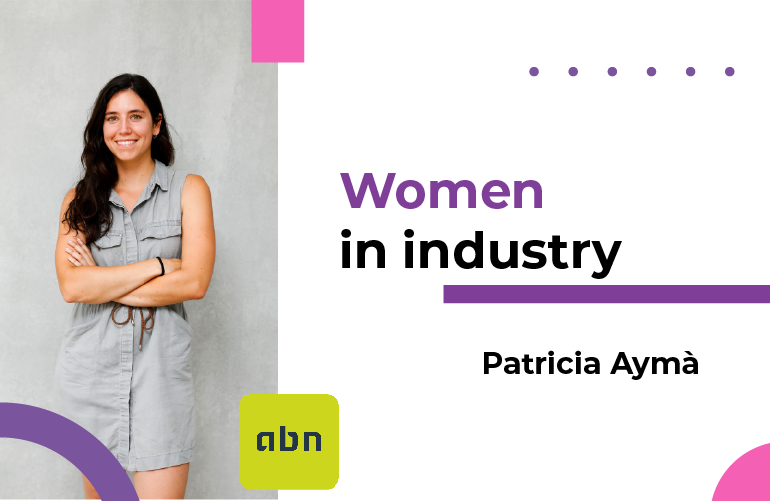In commemoration of the World Day of Women and Girls in Science, we present the second installment of our series of interviews to highlight #womeninindustry through talks with leading STEM professionals.
This month we talk to Patricia Aymà, biotechnologist, environmental engineer and co-founder as well as CTO of the innovative start-up VEnvirotech. This entrepreneur has managed to turn her interest in science into a pioneering company dedicated to transforming organic waste into bioplastics, thus contributing to sustainability and the 2030 Sustainable Development Goals.

“We must achieve a cultural change that consolidates leadership, emotional intelligence in all its dimensions and entrepreneurship”.
Patricia Aymà
Q: First of all, could you tell us a little bit about your professional career? Why did you decide to start a business?
A: I am a biotechnologist specialising in bioprocessing and environmental engineering. During my studies, I combined my studies with an internship and worked as a remedial teacher. Later, during my master’s degree, I did an internship in different environmental biotechnology departments, and in one of them I got to know the bacteria that produce bioplastics, which was what encouraged me to start a business idea.
My passion for bacteria that create products and services of value to the world, especially the production of bioplastics, was the motivation that drove me into entrepreneurship. The possibility of using bioplastics produced by bacteria offers a unique opportunity to improve the quality of life on our planet, thus contributing to the preservation of the environment.
Q: From your perspective, why is it important to increase women’s representation in science and technology?
A: Women have a lot to contribute to these currently gender-imbalanced sectors. As professionals we can bring new perspectives and approaches to these areas, and work with the same discipline and diligence in these sectors that have historically been associated with predominantly male roles, especially in leadership positions.
It is essential to break the gender gap, to overcome the famous “glass ceiling”, as our capacities are equally valid and significant.
Q: Why is there still a gender gap in the sector?
A: In my view, the persistence of the gender gap lies in the complexity of reconciling family and career advancement in research. In general, it is women who face the challenge of balancing their professional and family roles, which makes promotion and access to managerial roles difficult for large women scientists, limiting opportunities and the continuity of initiated projects.
In addition, it should be noted that sectors such as science are highly precarious and predominantly male-dominated, with sometimes even physical tasks in the technological field, making it difficult to support outstanding careers of female leaders. However, with ongoing social and cultural changes, this long-standing tradition is beginning to undergo significant transformations.
Q: Have you encountered any difficulties as a female researcher and biotechnology specialist? And as a businesswoman?
A: In both cases I have to answer no, I have never had any difficulties. I sincerely believe that it is a question of personal attitude. I am motivated to do things and therefore I look for all possible ways to reduce difficulties. So if there have been challenges associated with being a woman, I have not identified them as such.
Q: How can education and leadership training for women in science be promoted?
A: There are different actions that may be of interest in this context: campaigns to promote women leaders or role models of active women scientists, mentoring between women leaders and those in scientific training or specific entrepreneurship and leadership programmes aimed at women. We must achieve a cultural change that consolidates leadership, emotional intelligence in all its dimensions and entrepreneurship with basic training for women scientists and technologists in any educational institution in the country.
Q: What message or advice would you give to young women considering careers in science and technology, especially those interested in entrepreneurship?
A: We need you to be the future leaders and references of female entrepreneurship, persevering until there is no longer any limit to stop us, until there is no ceiling left!
